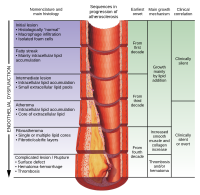
Is there any evidence that AGE/sRAGE is a universal biomarker/risk marker for diseases?
Sign Up to like & getrecommendations! Published in 2018 at "Molecular and Cellular Biochemistry"
DOI: 10.1007/s11010-018-3400-2
Abstract: Advanced glycation end products (AGE) and its cell-bound receptor called receptor for AGE (RAGE) are implicated in the pathogenesis of numerous diseases. Soluble receptor for AGE (sRAGE) counteracts the adverse effects of AGE-RAGE interaction by… read more here.
Keywords: srage universal; age; age srage; srage ... See more keywords

The soluble receptor for advanced glycation end-products (sRAGE) has a dual phase-dependent association with residual cardiovascular risk after an acute coronary event.
Sign Up to like & getrecommendations! Published in 2019 at "Atherosclerosis"
DOI: 10.1016/j.atherosclerosis.2019.05.020
Abstract: BACKGROUND AND AIMS The pro-inflammatory alarmin S100A12 (EN-RAGE) and the soluble form of its receptor, the receptor for advanced glycation endproducts (sRAGE), have diverging roles in cardiovascular disease. In experimental studies, S100A12 promoted atherosclerosis while… read more here.
Keywords: receptor advanced; cardiovascular risk; risk; srage ... See more keywords

Protection against RAGE-mediated neuronal cell death by sRAGE-secreting human mesenchymal stem cells in 5xFAD transgenic mouse model
Sign Up to like & getrecommendations! Published in 2017 at "Brain, Behavior, and Immunity"
DOI: 10.1016/j.bbi.2017.07.158
Abstract: Alzheimer's disease (AD), which is the most commonly encountered neurodegenerative disease, causes synaptic dysfunction and neuronal loss due to various pathological processes that include tau abnormality and amyloid beta (Aβ) accumulation. Aβ stimulates the secretion… read more here.
Keywords: neuronal cell; srage; rage; cell death ... See more keywords

An Integrative Genomic Strategy Identifies sRAGE as a Causal and Protective Biomarker of Lung Function.
Sign Up to like & getrecommendations! Published in 2021 at "Chest"
DOI: 10.1016/j.chest.2021.06.053
Abstract: BACKGROUND There are few clinically useful circulating biomarkers of lung function and lung disease. We hypothesized that genome-wide association studies (GWAS) of circulating proteins in conjunction with GWAS of pulmonary traits represents a clinically-relevant approach… read more here.
Keywords: integrative genomic; srage; pqtl; lung function ... See more keywords

NT-proBNP and sRAGE levels in early rheumatoid arthritis
Sign Up to like & getrecommendations! Published in 2022 at "Scandinavian Journal of Rheumatology"
DOI: 10.1080/03009742.2022.2042975
Abstract: Objective Several biomarkers of cardiovascular function are found to be increased in rheumatoid arthritis (RA), with some suggesting a relationship with disease activity and improvement with adequate anti-rheumatic treatment. Promising biomarkers include N-terminal pro-brain natriuretic… read more here.
Keywords: srage levels; probnp srage; srage; rheumatoid arthritis ... See more keywords

sRAGE Inhibits the Mucus Hypersecretion in a Mouse Model with Neutrophilic Asthma.
Sign Up to like & getrecommendations! Published in 2021 at "Immunological investigations"
DOI: 10.1080/08820139.2021.1928183
Abstract: Background: Neutrophilic asthma (NA) may result in irreversible airflow limitations. Soluble advanced glycosylation receptor (sRAGE) has been shown to be associated with neutrophilic airway inflammation. However, the association between sRAGE and mucus hypersecretion in NA… read more here.
Keywords: neutrophilic asthma; mouse model; srage; mucus hypersecretion ... See more keywords

Circulating Advanced Glycation End Products and Their Soluble Receptors in Relation to All-Cause and Cardiovascular Mortality: A Systematic Review and Meta-analysis of Prospective Observational Studies.
Sign Up to like & getrecommendations! Published in 2021 at "Advances in nutrition"
DOI: 10.1093/advances/nmab072
Abstract: Advanced glycation end products (AGEs) are involved in the development of several age-related complications. The protective role of soluble receptors for AGEs (sRAGE) against deleterious effects of AGEs has been indicated in several studies. However,… read more here.
Keywords: cause; srage; cvd mortality; mortality ... See more keywords

Soluble Receptor for Advanced Glycation End Products (sRAGE) Isoforms Predict Changes in Resting Energy Expenditure in Adults with Obesity during Weight Loss
Sign Up to like & getrecommendations! Published in 2022 at "Current Developments in Nutrition"
DOI: 10.1093/cdn/nzac046
Abstract: Abstract Background Accruing evidence indicates that accumulation of advanced glycation end products (AGEs) and activation of the receptor for AGEs (RAGE) play a significant role in obesity and type 2 diabetes. The concentrations of circulating… read more here.
Keywords: weight loss; srage isoforms; srage; energy expenditure ... See more keywords

P6596S100A8/A9 and sRAGE peripheral blood levels in patients with heart failure and an implanted cardioverter/defibrillator: relation with sustained, fast ventricular arrhythmias
Sign Up to like & getrecommendations! Published in 2019 at "European Heart Journal"
DOI: 10.1093/eurheartj/ehz746.1184
Abstract: Prediction of sudden cardiac death in heart failure (HF) remains suboptimal. Blood levels of the S100A8/A9 heterodimer protein complex and the soluble receptor of advanced glucation end product (sRAGE) are promising biomarkers in HF, reflecting… read more here.
Keywords: blood levels; heart; srage; heart failure ... See more keywords

A0659 Soluble receptor for advanced glycation end-products and age-dependent arterial stiffening in general population based prospective study
Sign Up to like & getrecommendations! Published in 2018 at "Journal of Hypertension"
DOI: 10.1097/01.hjh.0000548417.21108.13
Abstract: Objectives: Accumulation of advanced glycation end-products (AGEs) is one of pathophysiological processes, responsible for progressive stiffening of vessel wall. In contrast, soluble isoform of receptor for AGEs (sRAGE) act as a “decoy” for circulating AGEs… read more here.
Keywords: age dependent; arterial stiffening; age; dependent arterial ... See more keywords

AB0168 Elevated serum levels of hmgb1 and srage in patients with antiphospholipid syndrome
Sign Up to like & getrecommendations! Published in 2018 at "Annals of the Rheumatic Diseases"
DOI: 10.1136/annrheumdis-2018-eular.6187
Abstract: Background Antiphospholipid syndrome (APS) is a systemic autoimmune disease characterised by the presence of at least one clinical event among vascular thrombosis and/or pregnancy morbidity, in the presence of circulating antiphospholipid antibodies (aPL). High-mobility group… read more here.
Keywords: levels hmgb1; srage; serum levels; hmgb1 srage ... See more keywords